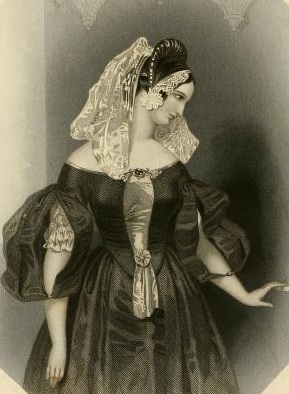| directory |
| home | contact |
|
|||||||||||||||
| search | |||||||||||||||
The Shakespeare Sisterhood: SilviaThe bare facts of Silvia's story, which are almost identical with those of Julia's, would to a certain extent warrant one in imagining a like identity of character; yet there is a clear difference between the gracious, well-disciplined Lady Silvia -- a court beauty, whose lightest act is governed by prescribed etiquette, and whose lofty dignity despises all tricks to attract admiration, all coquettish displays of wit or person -- and the Veronese belle, whose caprices are as countless as her lovers, and whose pretty head is at one time almost hopelessly turned by their fine speeches and the delightful contemplation of her own perfections.Both are in love; but how different is its expression in the two women: Silvia, incapable of indulging her vanity at the expense of her lover's peace, condescends to a pretty ruse to assure him of her favor; Julia, in the hey-day of successful coquetry, alternately blesses Proteus and drives him to despair, twenty times a day, as her fantastic humor may dictate consenting to make him happy, by a confession of her preference, only when her genuine sorrow at parting from him gets the better of her caprice. In devotion and fidelity they assimilate more closely but only in degree, not in kind: we feel sure that Silvia could never have continued to love a man whom she had found treacherous; with her passion would always be subordinate to principle; a shock to her sense of honor, from the object beloved, would prove its death-blow. She is less loving, in a general application of the expression, less impulsive, less vain, less womanly, than Julia; or rather, she is a higher type of woman: Silvia derives her strength from her intellect; Julia is strong only in her affections. As for their amorous pilgrimages: Julia's is undertaken in obedience to an impulse of wild, adventurous romance, having no authorities to consult but her waiting-maid and her own accommodating will a delicious indulgence of high-wrought passion in picturesque disguise, in mystery, in possible danger. That of Silvia, on the other hand, is forced upon her by cruel necessity: suffering the impertinent and pertinacious espionage of her father, and the suits of two detested aspirants for her hand, while her betrothed husband is banished the country, she has no choice but to comply with her father's wishes and marry Thurio, or to follow at all hazards him to whom her faith is plighted. Having once resolved on the latter course, she pursues it with her characteristic dignity and careful deliberation; and she escapes from her father's custody under the protection of a gentleman of the court, who is "vow'd to pure chastity" on the grave of his lady-love. We are convinced that nothing short of violence could have turned Silvia from her purpose; but we can readily believe that some necessary disfigurement in her page's costume might have rendered Julia's proposed freak distasteful, or even have deterred her from it altogether. Her beauty is, with Julia, a consideration of the first importance; she has made it the study of her dainty life; in a coquettish engagement she knows to a hair of her pencilled eyebrows how much each weapon is worth, and when the time to employ it; her first thought, on seeing the woman who has caused her lover to forget her is: In what is she more beautiful than I, that he should love her better? Silvia is not less informed of her rare charms of person -- perhaps no less happy in that knowledge; but she is seemingly devoid of even a trace of vanity; her serene brows are as guiltless of the blushes of a vulgar consciousness as those, crescent-crowned, of Dian. How to cite this article:___________ Related Articles
|

|
©1999-2021 Shakespeare Online. All Rights Reserved.